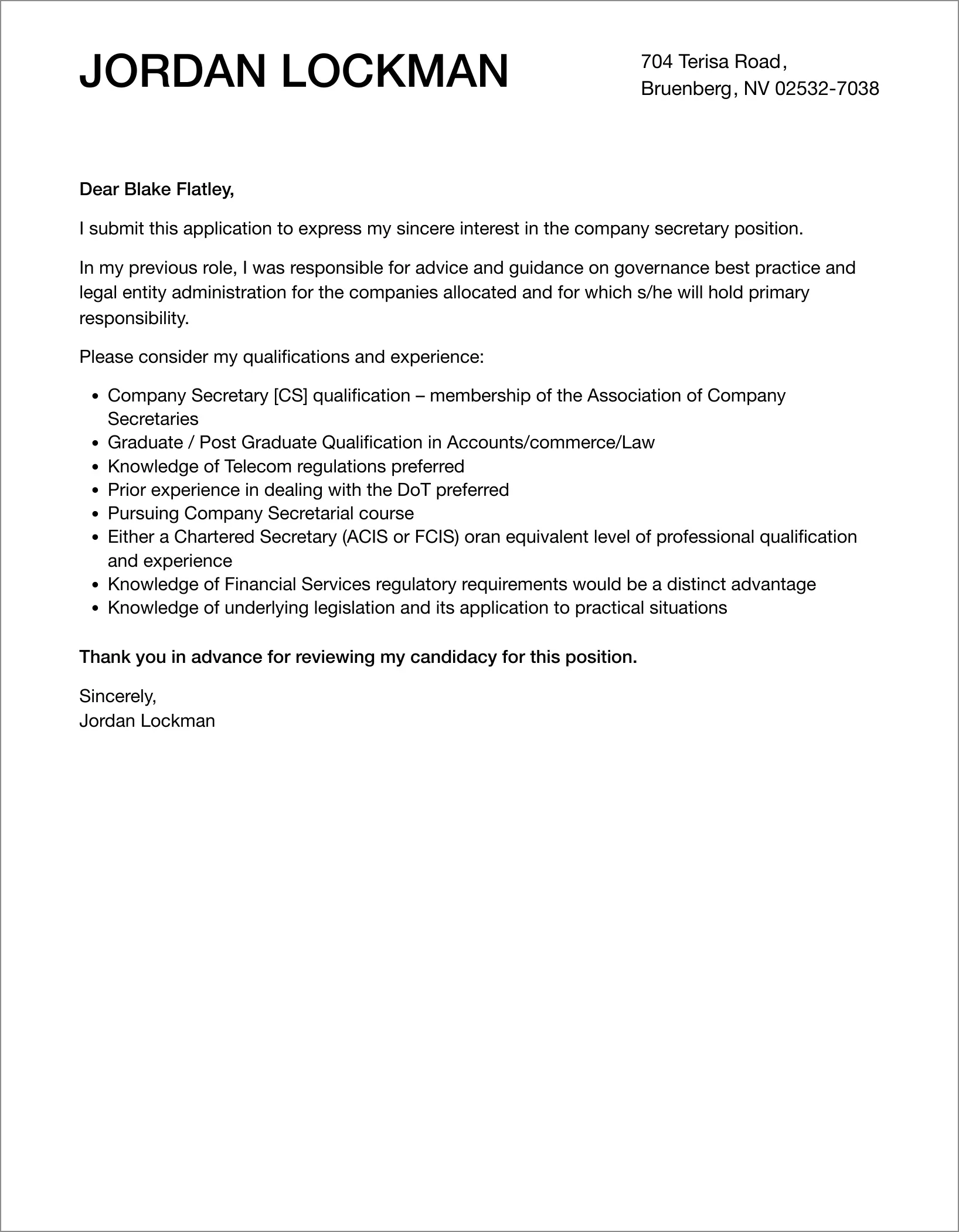Why a Cover Letter Is Crucial for a Secretary
In the competitive world of job applications, a well-crafted cover letter is your key to unlocking opportunities. For a secretary position, where first impressions are critical, a cover letter serves as your initial introduction to a potential employer. It’s your chance to go beyond the basic information in your resume and showcase your personality, enthusiasm, and relevant skills. A compelling cover letter can significantly increase your chances of securing an interview, allowing you to demonstrate why you are the ideal candidate for the role. Without a tailored cover letter, your application might be overlooked, especially when competing with numerous other applicants. It’s the perfect opportunity to express your genuine interest in the specific role and the company.
The Purpose of a Cover Letter
The primary purpose of a cover letter is to complement your resume by providing a narrative that highlights your qualifications and expresses your interest in the position. It allows you to personalize your application and demonstrate how your skills and experiences align with the specific requirements of the secretary position. A cover letter should emphasize your key strengths, professional achievements, and career goals, showcasing your suitability for the role. It also offers an opportunity to explain any gaps in your employment history or to address any concerns that the hiring manager might have. Furthermore, a cover letter helps you stand out from other applicants by revealing your personality and passion for the secretarial field.
Highlighting Your Skills and Qualifications
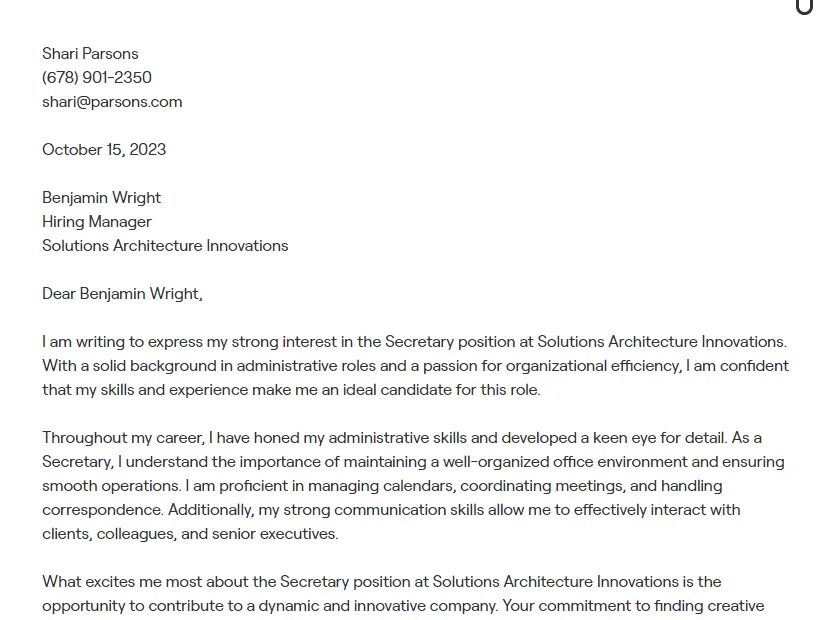
Secretaries play a vital role in maintaining an organized and efficient office environment. When crafting your cover letter, it’s essential to highlight the skills and qualifications that make you an exceptional candidate. Focus on your proficiency in administrative tasks such as scheduling, managing correspondence, and handling phone calls. Emphasize your strong organizational abilities, attention to detail, and ability to prioritize tasks effectively. In addition to these essential skills, showcase your computer literacy, including your experience with relevant software like Microsoft Office and any other specialized programs. Highlight your communication skills, both written and verbal, and demonstrate your ability to interact professionally with clients, colleagues, and supervisors.
Showcasing Your Professionalism
Professionalism is the cornerstone of a successful secretary. Your cover letter should reflect this quality through its tone, language, and presentation. Use a formal and respectful tone throughout the letter. Avoid slang, jargon, or overly casual language. Proofread carefully for any grammatical errors or typos, as these can detract from your credibility. Demonstrate your commitment to maintaining confidentiality and handling sensitive information with discretion. Mention any experience you have in handling confidential documents, managing sensitive communications, or maintaining a secure office environment. Showcase your ability to work effectively under pressure, manage multiple tasks simultaneously, and adapt to changing priorities while maintaining a positive attitude.
Formatting Your Secretary Cover Letter
The formatting of your cover letter is just as important as its content. Use a clean and professional layout that is easy to read. Choose a standard font, such as Times New Roman or Arial, and use a font size between 11 and 12 points. The format should include your contact information at the top, followed by the date, the hiring manager’s name (if known), and the company’s address. Use single-spaced lines with a space between each paragraph. Keep the letter concise, ideally within one page. Ensure your cover letter has a clear structure, including an introduction, body paragraphs, and a closing. Proper formatting showcases your organizational skills and attention to detail, leaving a positive impression on the hiring manager.
Contact Information and Date
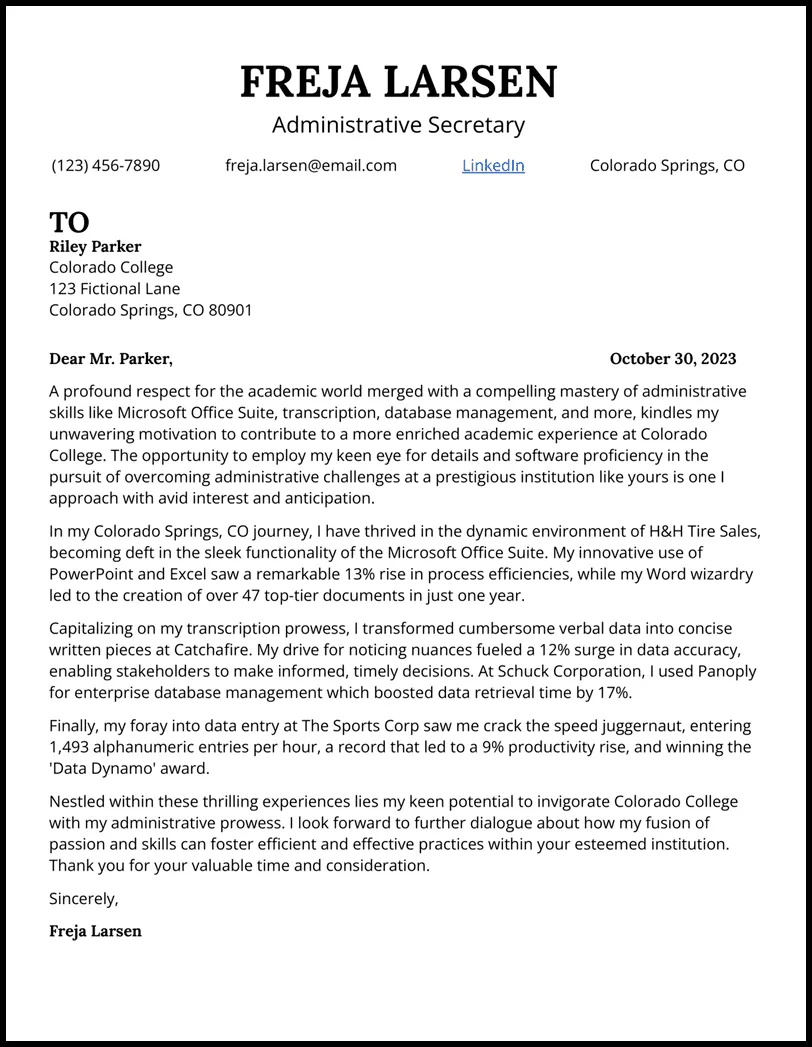
Begin your cover letter by providing your contact information at the top. Include your full name, address, phone number, and email address. Ensure that your email address is professional and appropriate for a job application. After your contact information, include the date. This indicates when you wrote and sent the letter. Formatting your contact details and the date correctly is crucial to present a professional image.
Greeting the Hiring Manager
Your greeting sets the tone for your entire cover letter. Whenever possible, address the hiring manager by name. Research the company to find the name of the hiring manager. If you cannot find a specific name, use a professional greeting such as “Dear Hiring Manager” or “Dear [Company Name] Hiring Team.” Avoid generic greetings like “To Whom It May Concern.” Using a personalized greeting immediately grabs the reader’s attention and shows that you’ve taken the time to learn about the company and the role.
Writing a Compelling Opening Paragraph
The opening paragraph is your first chance to make a strong impression. Immediately state the purpose of your letter and the position you’re applying for. Mention where you saw the job posting (e.g., online, job board, company website). Express your enthusiasm for the role and the company. Consider including a brief statement about your key skills or qualifications. Keep the opening paragraph concise and engaging, designed to capture the hiring manager’s interest and encourage them to read further. This initial paragraph should communicate why you are a good fit for the secretary position, setting the stage for the rest of your cover letter.
Body Paragraphs Tips
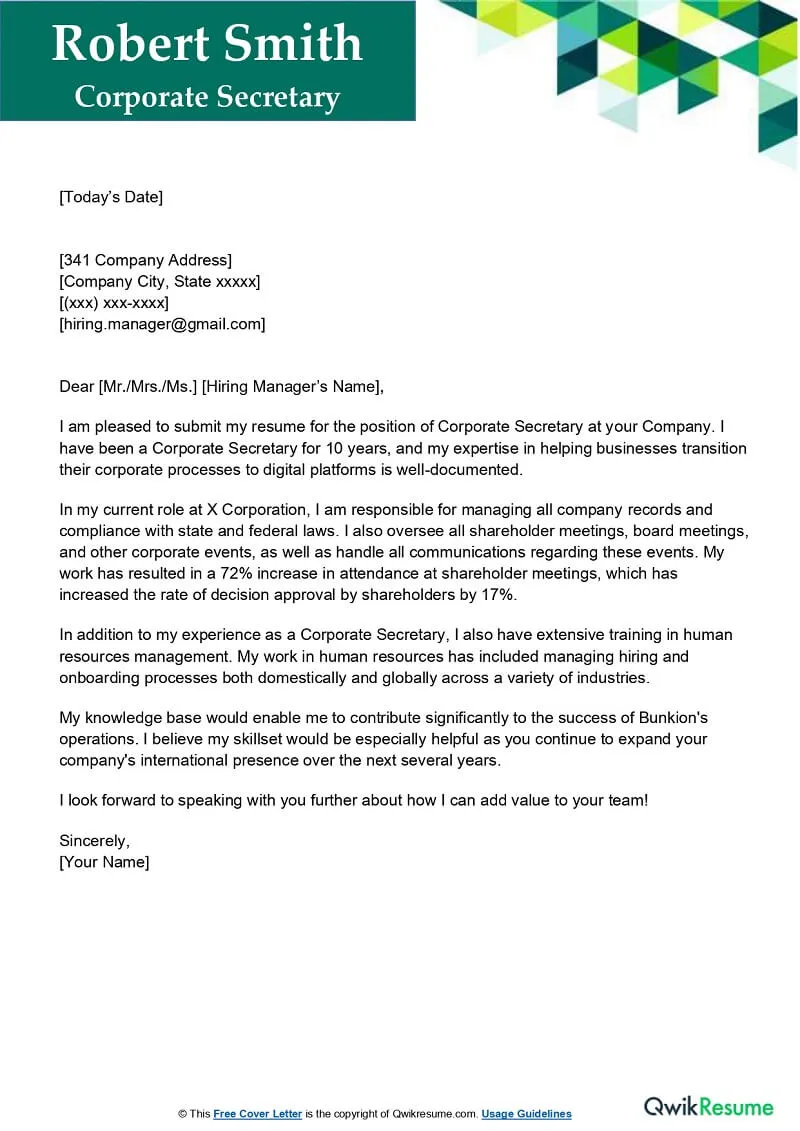
The body paragraphs are where you elaborate on your qualifications and experiences. Use these paragraphs to highlight your skills, showcase your achievements, and demonstrate your understanding of the job requirements. Structure your body paragraphs logically, with each paragraph focusing on a specific aspect of your skills or experiences. Use strong action verbs to describe your accomplishments and responsibilities. Quantify your achievements whenever possible. Provide concrete examples of how you have demonstrated your skills in previous roles. Tailor your content to match the specific requirements mentioned in the job description, ensuring you address all the necessary criteria.
Highlighting Relevant Experience
Detail your relevant work experience, focusing on experiences that demonstrate your ability to perform the duties of a secretary. Describe your previous roles, emphasizing your responsibilities and achievements. Highlight any administrative tasks you’ve performed, such as managing schedules, coordinating meetings, and handling correspondence. Quantify your accomplishments by including specific results or metrics. For example, mention how you improved office efficiency, streamlined processes, or successfully managed a high volume of incoming calls. Provide clear examples of your ability to work independently and as part of a team, highlighting experiences where you demonstrated initiative and problem-solving skills.
Showcasing Your Skills
Focus on your key skills that align with the requirements of the secretary position. Showcase your proficiency in Microsoft Office Suite, including Word, Excel, PowerPoint, and Outlook. Mention your typing speed, accuracy, and experience with other relevant software. Emphasize your communication skills, both written and verbal, including your ability to draft professional correspondence, handle phone calls, and interact with clients. Highlight your organizational skills, attention to detail, and ability to prioritize tasks effectively. Mention any experience you have with managing calendars, scheduling appointments, or coordinating travel arrangements. Illustrate how you’ve used your skills to contribute to the success of previous employers.
Emphasizing Your Enthusiasm
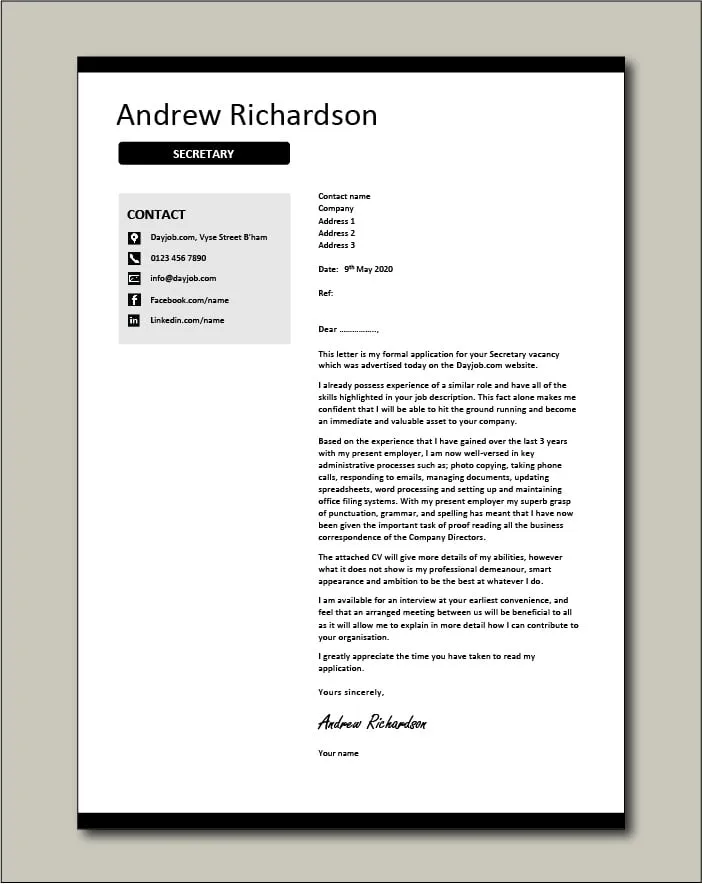
Convey your genuine enthusiasm for the role and the company. Express your interest in the secretarial field and describe why you are drawn to this particular position. Show that you have researched the company and understand its mission, values, and culture. Highlight any aspects of the company that resonate with you and explain how your skills and experiences can contribute to its success. Demonstrate your eagerness to learn and grow within the role. Enthusiasm can set you apart from other candidates and demonstrates that you are committed to the company’s success.
Crafting a Strong Closing
Your closing paragraph should reiterate your interest in the position and thank the hiring manager for their time and consideration. Reiterate your enthusiasm for the opportunity and briefly summarize your key qualifications. Express your availability for an interview and mention how you can be reached. Keep the closing paragraph concise and professional. Conclude your letter with a polite closing, such as “Sincerely” or “Best regards,” followed by your typed name. This final touch reinforces your professionalism and leaves a lasting positive impression.
Proofreading and Editing Your Cover Letter
Before submitting your cover letter, proofread it carefully to ensure it is free of errors. Check for any grammatical errors, typos, or spelling mistakes. Read the letter aloud to identify any awkward phrasing or sentences. Use a grammar and spell checker, but don’t rely on it entirely. It’s always best to have someone else review your letter for clarity and accuracy. Ask a friend, family member, or career advisor to review your cover letter. A fresh pair of eyes can catch errors that you might have missed. Proofreading is a critical step in ensuring that your cover letter is polished and professional, leaving a positive impression on the hiring manager.
Common Mistakes to Avoid
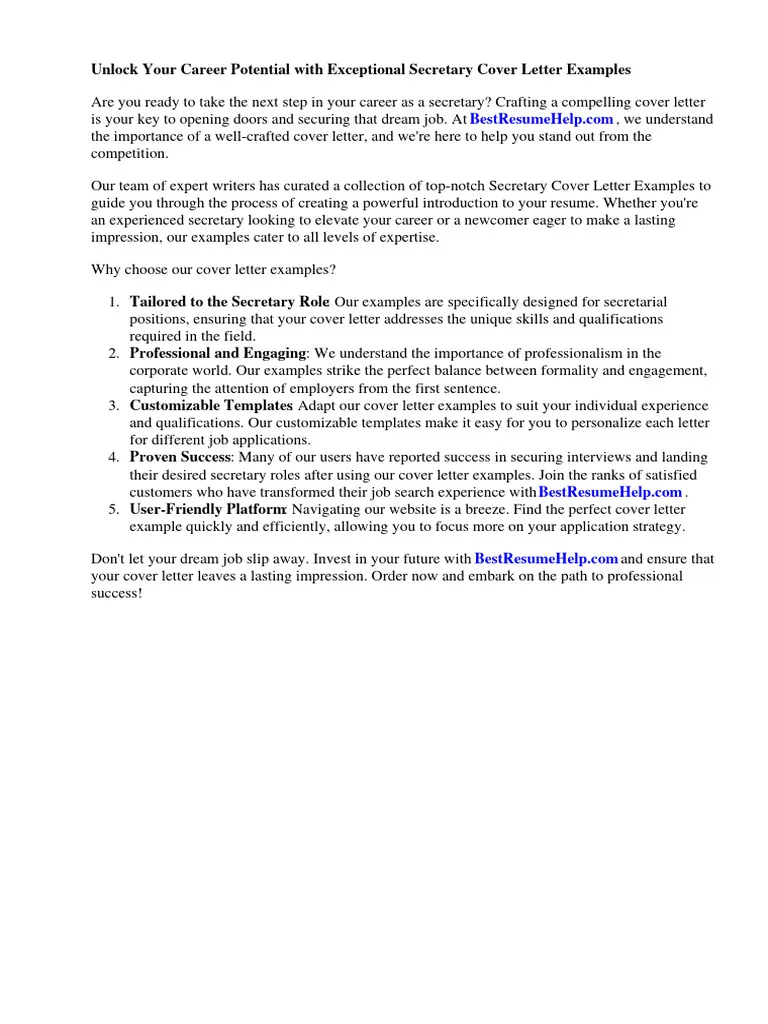
Avoid common mistakes that can undermine your application. Do not use generic cover letters. Customize each cover letter to match the specific requirements of the job. Avoid using overly casual language, slang, or jargon. Keep the letter concise and focused. Don’t include irrelevant information or details that are not directly related to the job. Avoid negative statements or criticisms of previous employers. Don’t exceed one page in length. Proofread carefully to avoid any errors in grammar or spelling. A well-crafted cover letter is a crucial step in securing a secretary position; by avoiding common mistakes, you greatly enhance your chances of success.
